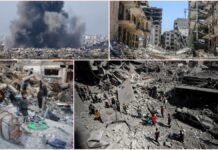
Tel Aviv: The war between Israel and Hamas has entered its 38th day, with no signs of abating. The conflict, which started on October 7 when Hamas launched a surprise attack on Israel from the Gaza Strip, has claimed the lives of about 13,000 people, mostly civilians. Israel has responded with a relentless bombing campaign in Gaza, targeting Hamas positions and infrastructure. According to the Israeli army, more than 400 Hamas sites have been destroyed so far. Israel has also demanded the release of about 250 Israeli citizens who were taken hostage by Hamas during the attack.
However, Hamas has set a condition for Israel to free the hostages. On Monday, a spokesman for the military wing of Hamas, Abu Obaidah, said that Hamas was ready to release 100 Israeli hostages in exchange for 200 Palestinian children and 75 women who are held in Israeli prisons. He also said that Hamas wanted a five-day ceasefire and humanitarian aid for the people of Gaza, who are suffering from the Israeli blockade and bombardment. He accused Israel of delaying a possible deal that was mediated by Qatar.
Qatar, a small Gulf state that has close ties with Hamas, has been playing a vital role in the negotiations to end the war and secure the release of the hostages. Qatar has already brokered the release of four hostages, two Israelis and two American-Israelis, who were freed last week. Qatar has also facilitated the evacuation of foreign nationals and injured Palestinians from Gaza to Egypt, in coordination with Israel, Hamas, and the United States.
On Sunday, Israeli Prime Minister Benjamin Netanyahu told US media that he was hopeful of reaching a deal to free the hostages in Gaza, but he did not give any details. He said that Israel was not willing to stop its military operations until the hostages were released and Hamas was defeated. He also said that Israel had the support of the United States and other allies in its fight against Hamas.
The war between Israel and Hamas has been the deadliest and most complex in their history. Hamas, which is considered a terrorist organization by Israel, the United States, and the European Union, has shown its ability to infiltrate Israel by air, sea, and land, and to launch thousands of rockets at Israeli cities. Israel, which is the most powerful military force in the region, has shown its determination to crush Hamas and to protect its citizens from the attacks. The war has also sparked protests and violence in the West Bank, where Palestinians have clashed with Israeli forces and settlers. The war has also drawn the attention and involvement of other regional and international actors, such as Egypt, Iran, Turkey, the United Nations, and the European Union.

The fate of the hostages, who are mostly civilians, remains uncertain. Their families and friends have been appealing for their safe return, and for an end to the war. The international community has also called for a ceasefire and a political solution to the conflict. However, the prospects of peace seem dim, as both sides continue to exchange fire and accusations, and as the humanitarian crisis in Gaza worsens. The war between Israel and Hamas has become a tragedy for both peoples and a challenge for the world.






















































